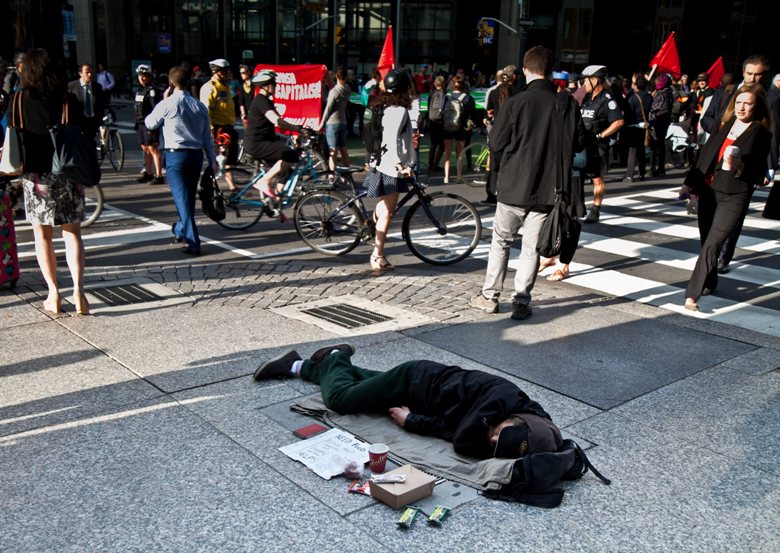The gaping chasm between the world’s richest and poorest citizens is widening more rapidly than expected, says Oxfam International, and it’s a trend being reflected here in Canada.

A new report released by Oxfam on Monday highlights some alarming statistics. Perhaps most notably, the organization has estimated that the richest 62 people on Earth now own the same amount of wealth as the poorest half of the global population (approximately 3.6 billion people).
Meanwhile, the have-nots are getting poorer and the resulting inequality is getting worse — fast. A mere five years ago, the number of billionaires who had accumulated the same amount of wealth as the bottom 50 per cent of the population stood at 388.
While developing nations certainly see the starkest inequality, Canada is a kind of microcosm of the broader global pattern, noted Oxfam Canada executive director Julie Delahanty.
“In Canada there continues to be this huge gap between the rich and the poor, and it’s growing,” she said. “The people who are really losing out … are the working poor in particular, who are not seeing the gains of economic growth.”
According to Oxfam Canada:

Get daily National news
- Five Canadians have the same wealth as the bottom 30 per cent of our population – more than 11 million people.
- The poorest 10 per cent of Canadians only make about $2.30 more per day than they did 25 years ago.
- The wealth of the five richest Canadians has risen by $16.9 billion since 2010, a 44 per cent increase.
- The poorest half of Canada’s population has received just 26 per cent of the total increase in income growth.
As Prime Minister Justin Trudeau gets set to attend the World Economic Forum in Switzerland, Delahanty said there are a few things his government could be doing to combat the patterns being highlighted by Oxfam. The first is to lead the charge internationally against tax havens. It’s estimated that $7.6 trillion of individuals’ wealth sits offshore, tax-free, and that if tax were collected on the income that this wealth generates, an extra $190 billion would be available to governments each year.
READ MORE: World Economic Forum revokes invitation to North Korea to attend annual meeting
That money could then be re-invested in social programs that benefit the poorest people, Oxfam has suggested.
“Canada is one of the biggest losers when it comes to tax havens,” Delahanty explained. “But in any country, it’s a loss of revenue. So they should be working a lot harder than they have been.”
The Liberal plan to provide tax relief for the so-called middle class while increasing taxes on the richest Canadians is a good start, said Delahanty, but it ignores the people right at the bottom who are barely scraping by.
“We need more money for public services, for health and education and childcare. Things that have an overwhelming benefit for the poorest, and particularly for women,” she said, adding that this should be a no-brainer for a prime minister who has “made really strong statements around gender equality and women’s rights.”
On the legislative side, Oxfam Canada is encouraging the Canadian government to look at forcing the closure of the gender wage gap. Studies have shown that Canadian women are still making, on average, about $8,000 less a year than men for doing the same job.
“It’s also having legislation in Canada that requires companies to provide a living wage by province,” Delahanty said. “We know what a living wage is in each province and we could make so-called minimum wages actually be a living wage. That’s something that the government could put pressure on provinces to make happen.”
Canada’s Richest
1. The Thomson Family (net worth $36.76 billion): Thomson Reuters
3. Garrett Camp (net worth $9.18 billion): Uber, web development
4. The Rogers Family (net worth $8.86 billion): Rogers Communications
5. The Irving Family (net worth $7.50 billion): Forestry, shipbuilding, Irving Oil
(Source: Canadian Business magazine)









Comments